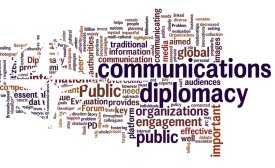europe

Assessment and evaluation of public diplomacy remains an undeveloped study area. Governments, institutions and international organizations continue to struggle in defining the right approach to evaluate the impact of their programs on their audiences.
The British government has faced criticism for its lack of response to the huge numbers of refugees who are heading to Europe in search of safety, yet [...] a small but dedicated group of football fans, who originally met through their love of the Hamburg-based left-wing club, St Pauli, organize various football-related events with refugees and asylum seekers who are already in the UK.
[FC] Barcelona President Josep Maria Bartomeu has threatened to take UEFA as far as the European Court of Human Rights after the club were fined for fans displaying flags supporting Catalan independence. European football's governing body fined Barca 40,000 euros ($44,000, £28,800) for the flags displayed during the European champions 2-1 win over Bayer Leverkusen last month.
A statue of Vladimir Lenin in Odessa, Ukraine, has been refashioned into Darth Vader. A Ukrainian artist, Alexander Milov [...] transformed the statue in response to recent decommunization laws, which require the removal of Communist symbols in Ukraine [...] “I wanted to make a symbol of American pop culture which appears to be more durable than the Soviet ideal,” Mr. Milov told the BBC.
The U.K. has pledged to transition to at least 15 percent renewable energy by the year 2020 [...] the completion of such a prestige project would not only help the country meet its stated goal, but would usher in a new era of eco-minded design, and inspire other communities in search of new sources of green energy to cast their eyes, and their turbines, out to sea.
With migration tearing at the EU’s cohesion, politicians are linking foreign policy to strategic interests rather than democracy and human rights. Will 2015 be seen as the year that the European diplomacy got realpolitik? With migration tearing at the cohesion of the European Union, more politicians have started to see the bloc’s foreign policy as a way to secure Europe’s strategic interests, shifting away from the EU’s traditional focus on democracy and human rights.
In an effort to better Greece's international image, the country's Department of Foreign Affairs has stated it will strengthen ties with the Greek diaspora to fend off the stigma of 'Grexit' to a more appropriate 'Greform' (Greek reform), following the effects of its economic crisis.
Andrew K Rose estimates that a 1% net increase in ‘soft power’ raises exports by around .8%. Do countries do well by doing good? More precisely, does a country admired by others reap any benefit? My research indicates that the answers to these questions is “yes” and “yes”. I have taken advantage of a quantitative measure of soft power to show that a country sells more exports to nations that perceive it to be a force for good, holding other factors constant.







